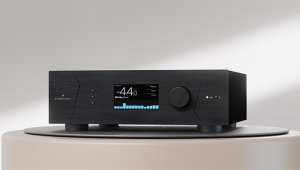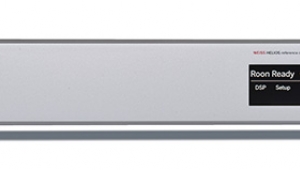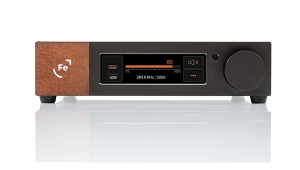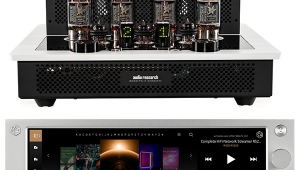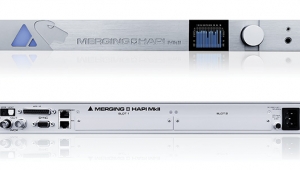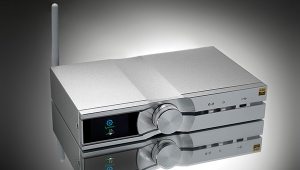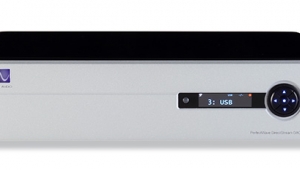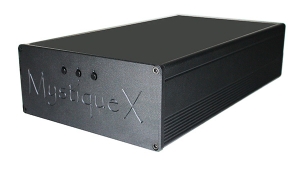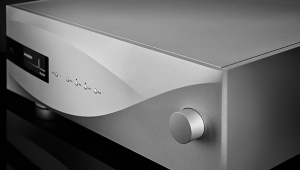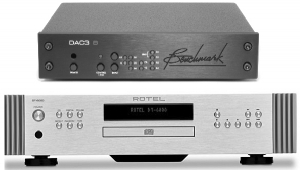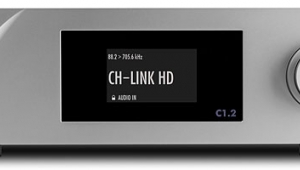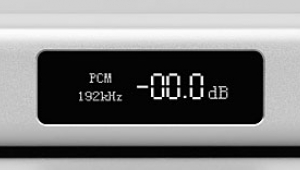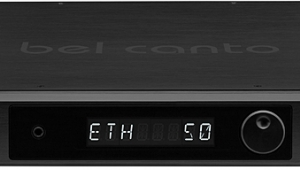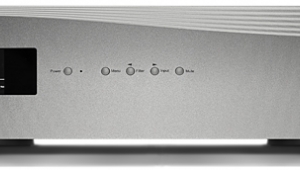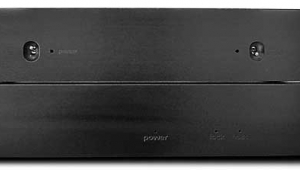| Columns Retired Columns & Blogs |
Mytek HiFi Brooklyn D/A processor–headphone amplifier Page 2
So I ordered up some long cables and tried this at home. The Brooklyn sat on the little table by my listening seat, and power, USB, and XLR cables were draped all over the room (footnote 5). From these experiments I learned that MQA files sound much better with MQA turned on, and that the analog volume control sounds better than the digital one. I didn't try toggling the digital filters.
Footnote 5: With the Brooklyn on the rack, you could accomplish the same thing by using the included Apple remote or the aforementioned control-panel software, but from a distance you'd have a harder time reading the Brooklyn's small display.
Long-term Listening
For most of my listening tests I ran the Brooklyn's outputs straight into a pair of Lamm Industries M1.2 monoblocks via Mogami Gold microphone cables, using the Brooklyn to control the volume. I set up the server to loop a long playlist and left it running for about three days. Once the Brooklyn was well cooked, I did my usual format check and confirmed that it can play PCM up to and including 24/352.8 (and 32/96, the only 32-bit file I had on hand), and DSD up to 128. (I don't own any quad-DSD files.) All played flawlessly, with one small annoyance: a loud thump through the speakers when I switched from DSD to high-sampling-frequency PCM. After that, the file played fine (footnote 6).
Band in Brooklyn
Forget Jay-Z: Brooklyn's musical heritage extends back at least to George Gershwin, who was born here in 1898, and Aaron Copland, born two years later. Max Roach and Cecil Taylor grew up in Brooklyn. Freddie Hubbard, Eric Dolphy, and Wes Montgomery lived together for a while at Slide Hampton's house at 245 Carlton Avenue—hence "245," on Dolphy's Outward Bound album. It's common knowledge that Brooklyn has produced its share of well-known indie bands and musicians: Dirty Projectors, Grizzly Bear, The National, Sufjan Stevens, TV on the Radio, the Yeah Yeah Yeahs, to name a handful. But in reviewing the Brooklyn, I decided to feature Brooklyn artists who aren't quite so famous. (I also listened to many tracks I'm more familiar with.)
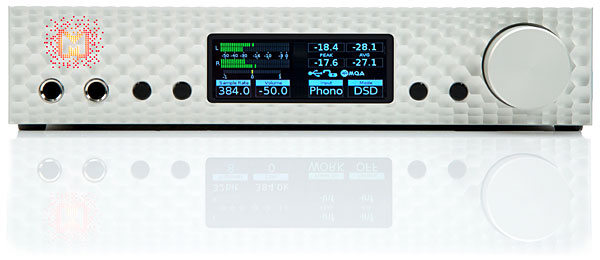
Not one of the five members of jazz collective Brooklyn Aliens is from Brooklyn; two are from Spain, and the others are from Germany, Sweden, and Chile. They met in Brooklyn, though, and all were granted US visas in the category of Aliens with Extraordinary Ability—hence the name. Their eponymous first album, released earlier this year on a Swiss label (Unit UTR 4696; I heard it on Tidal at CD resolution), is jazz with a touch of third-stream character. Track 3, "Miniatura," could almost be an audio test track: 96 seconds of double-bass notes repeating under simple tones from flute, clarinet, and what sounds like a marimba playing octaves with a piano. The Brooklyn DAC differentiated the characters of the wind instruments—a fairly easy test—and also the characters of the piano and marimba playing together. (That's harder.) Bassist Lars Ekman's light plucks produced natural, thready transients followed by sustained notes with woody resonance and a little fuzz. The simplicity of the music focuses the listener's attention on the contrasting colors and textures of the various instruments—surely what the Aliens intended—and the Mytek DAC delivered.
The Washington Post described violinist Colin Jacobsen as "one of the most interesting figures on the classical music scene." He and his brother Eric, a cellist, grew up in Brooklyn playing music with friends and eventually formed Brooklyn Rider, a string quartet. Among the quartet's albums is A Walking Fire (CD, Mercury Classics B0018309-02; I listened to a 24/96 download from HDtracks), which sandwiches Bartók's String Quartet 2 between contemporary works, one of which—Three Miniatures for String Quartet—Colin composed. Fire is a good example of how a revealing DAC can spotlight a recording's flaws: This thoroughly enjoyable album is recorded so close it might make you feel like opening a window. True, its in-your-head character can be intoxicating, especially but not only with headphones, but it isn't natural. The quartet's most recent album, The Brooklyn Rider Almanac (CD, Mercury Classics B0021593-02), has better sound, and features compositions by other Brooklyn-based composers. Both albums are available on Tidal at CD resolution.
Brooklyn is also home to excellent and interesting recording engineers, including Barry Diament, the purist mastermind behind Brooklyn's Soundkeeper Recordings label. Diament recorded and mastered Equinox, the album by Markus Schwartz and Lakou Brooklyn (CD, Soundkeeper SR1002) that was Stereophile's "Recording of the Month" for February 2011. (Schwartz, too, lives in Brooklyn.) Equinox is a superb and enjoyable recording, but I focused on a different Diament project: Confluence, by Brooklyn-based singer Jason Vitelli (24/192 AIFF download, Soundkeeper SR1003A).
Confluence is seriously, committedly idiosyncratic, for the production and for the variety of music it encompasses. One track features electric guitar and bass, acoustic guitar, drums, main and background vocals, French horn, celeste, and a real grand piano—all captured by just two mikes. (Need a little more piano in the mix? Just move it closer.) Musically, each track on Confluence is fairly conventional, but the conventions are all over the place: There's more than a little Morrissey here, perhaps a bit of Broadway musical (although the sensibility is decidedly dark)—and then the guy starts playing 1970s album rock. If you like to put all your pigeons in one hole, this music might not be for you, but open-minded listeners are likely to love it. (Or not: Even Diament, in an e-mail, called it "an acquired taste.") Anyway, whether or not some or all of the music resonates with you, this is the kind of recording that, when played through a good system—including a high-quality DAC like the Brooklyn—can provide musical and aural pleasure.
Nico Muhly, who composes operas and other genres of contemporary classical music, is hardly obscure; his Two Boys made its North American debut at the Metropolitan Opera. Yet his Mothertongue (CD, Brassland HWY-018) doesn't sound as if it was written by an opera composer: it's a weird juxtaposition of Elizabethan music, Jean-Michelle Jarre's Zoolook, and who knows what else. It's also sonically spectacular. At one point while listening through the Mytek, I heard a clicking sound that seemed to emerge from my laptop, which was sitting in my lap while I sat in front of my two loudspeakers; the clicking was, of course, on the recording, and emerging from my speakers. But spatial tricks are not the point: this is a weird and wonderful album, committedly idiosyncratic and highly recommended.
Muhly works with a lot of pop musicians. He wrote string arrangements for Ane Brun's Changing of the Seasons (CD, Cheap Lullaby CLR-028), a record I've listened to many, many times and know extremely well. Through the Brooklyn, Brun's voice in "True Colors" (this track appears only on the US edition), with her Cyndi Lauper quaver, was creamy and close, with a good measure of breathiness and chest. In the title track, the guitar was big and woody, with a soft touch on the strings and Brun's lines about the challenges of living are surely correct—"It's hard to be safe / It's difficult to be happy"—but listening to this disc through a good system can at least help with the latter.
MQA and Vinyl
Unable to find MQA recordings by Brooklyn-based artists—I'm pretty sure there aren't any yet—I turned to something familiar: Bjørn Solum and Kristin Fossheim's recording of Beethoven's Sonata 2 in g for Cello and Piano, Op.5 No.2 (SACD/CD, 2L 2L-079-SACD; I listened to the MQA download). In the Rondo: Allegro, Solum's cello tone reminded me of a good prime rib; I could almost feel the juice running down my chin. Fossheim's fortepiano stole the show, however: there was so much richness from the transients that in my mind I saw sparks fly—bright, multicolored sparks. With MQA switched off, the sound was still far beyond reproach, but much of that sparkle was lost.

The Brooklyn's onboard phono stage wasn't designed to be a giant-killer, Jurewicz told me, but to play a necessary part in a complete package. The Brooklyn "is a product for someone who wants something compact," he said at our meeting. "They have their computer, some music on their hard drive, maybe they log in to Tidal for some streaming—and they have a turntable and maybe on the weekend when their girlfriend comes they play a record. So the idea was not to design the best-ever phono preamp, but to design a very good one." He brought in several well-regarded phono stages ca $2000, listened, and tried to make something better.
I'll leave it to my more vinyl-focused colleagues to take the full measure of the Brooklyn's phono stage against the state of the art, but I thought it sounded very good. It wasn't overbright, it deemphasized groove noise, and it never lost its composure. It gave up a little color, in MC mode, to my usual tube phono preamp (EAR 834P) plus step-up transformer (Auditorium 23 Standard), but not much. And when I switched to MM and reinserted the transformer, I'm not sure it gave up anything. And the Brooklyn was much quieter.
Summing Up
The Mytek Brooklyn was not an easy component to get a handle on; I had to listen hard to take its measure. When I did, I heard bass instruments reproduced fully and cleanly, with much texture and character. Aural images were precisely positioned in space. The soundstage was deep and layered, with musicians clearly laid out from front to back. The sound was very open—except, of course, with claustrophobic-sounding recordings. MQA took it up several notches, providing richer textures and better transients.
Apart from all that, there are two things you need to know about the Brooklyn. First, it's basically a pro DAC. It has all the features the audio professional needs, and it will play exactly what's on a recording, including what you might not want to hear. (I hope that doesn't sound forbidding: One Friday night, after I'd finished all of the listening and most of the writing for this review, I let Roon Radio take over my server, choosing tracks at random. I had a drink and enjoyed the music uncritically—and I had a blast.) Second, it has a consumer-friendly feature set: In a single, small device you get not only digital conversion of every relevant audio format, but also phono equalization and amplification, component switching, and remote volume control. Add a compact amp, speakers, and a turntable, and you'll have a system worthy of any upscale Williamsburg studio apartment.
Footnote 5: With the Brooklyn on the rack, you could accomplish the same thing by using the included Apple remote or the aforementioned control-panel software, but from a distance you'd have a harder time reading the Brooklyn's small display.
Footnote 6: Another operational glitch: Twice, the Brooklyn froze when I turned it on from Standby mode. Unplugging it and plugging it back in got things working again within seconds.
- Log in or register to post comments
